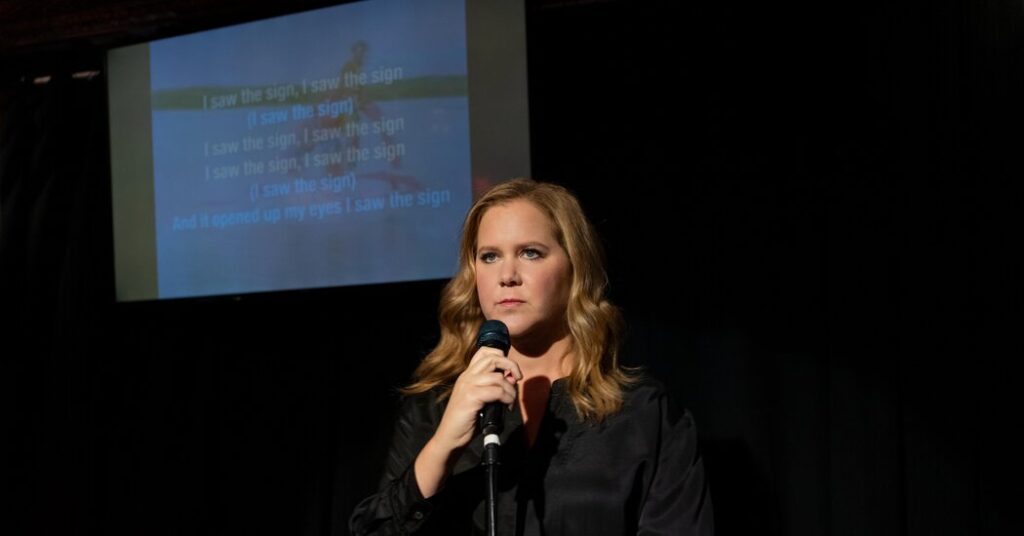
Amy Schumer has not been absent from television during the six years since the end of her intermittently brilliant sketch show, “Inside Amy Schumer.” She’s had a couple of Netflix stand-up specials and made a detour into reality TV (“Amy Schumer Learns to Cook,” “Expecting Amy”). Next week she’ll be an Oscars host.
Still, the autobiographical-ish “Life & Beth,” premiering Friday on Hulu, feels like a return. It’s not a triumphant one, but it has touches of the old Schumer, smart and transgressive and self-aware. They’re stretched out a little too thinly over the 10 half-hour episodes, and they don’t really compensate for the overall sentimentality and simplistic psychology. But for the true fan, they’ll be worth the relatively short binge.
Schumer created “Life & Beth” and wrote half the episodes (she also directed four), and the known congruences between her life and that of her heroine, Beth Jones, align it with other personal shows by female comedians like “Somebody Somewhere,” “One Mississippi” and “Better Things.” Beth, like Schumer, attended high school in suburban Long Island; like Schumer, she experienced a change in lifestyle when her father’s business failed. Schumer has spoken about her husband, Chris Fischer, being on the autism spectrum; Beth’s romantic interest, John (Michael Cera), demonstrates a pronounced, if generally charming, social and personal awkwardness.
Schumer takes the genre in her own direction, though, by welding together its usual narrative — the melancholy story of self-discovery — and her preferred mode in films, the bawdy, ugly duckling romantic comedy.
Beth, an unhappy Manhattan wine saleswoman, experiences a personal loss that sends her on a memory journey through her Long Island childhood and forces her to confront her feelings about her judgmental, needy mother (Laura Benanti). As events in the present trigger continual flashbacks to Beth’s childhood, it’s as if Schumer were digging up the roots of her own stage persona.
Going on at the same time is the rom-com, in which Beth blows up her relationship with a man-child co-worker (Kevin Kane) and begins to fall for farmer John, who tends to the vegetables and animals at a Long Island vineyard.
The two story strands are connected — Beth’s attraction to the rustic John, and her reintroduction to Long Island’s natural beauty, is part of the mellowing process that eventually allows her to reconcile herself to her past. But it’s a superficial tie, and the show’s tone and style swerve between the more solemn family material and the more comic love story.
There are highlights on both sides, mostly in what feel like stand-alone sequences that have the energy and inventiveness that Schumer brought to sketch comedy. Jonathan Groff shows up in an amusing bit as a Long Island Lothario who’s attracted to Beth because of her Manhattan connection; his obsessive love for the city is right out of an early Billy Joel song. A long scene in which Beth; John; and Beth’s sister, Ann (Susannah Flood), fish while on mushrooms has an engaging, improvisatory vibe. Helping to keep things interesting is an eclectic array of guest stars who include Hank Azaria as a dyspeptic funeral director and David Byrne as a doctor with an awkward bedside manner.
The straightforward, emotionally grounded acting that much of “Life & Beth” requires isn’t Schumer’s strength, but Flood and Benanti give her excellent support. (Violet Young, Lily Fisher and Grace Power are also good as Beth, Ann and Beth’s best friend in the flashbacks.) And Michael Rapaport, as Beth’s flawed but charismatic father, Leonard, provides some touching moments. He is showcased in the series’s best sequence, a tense, bravura scene in which Leonard rallies himself to help Beth acquire a crucial account.
That high point is followed by a theatrical kicker that feels tacked-on and trite — Beth is wowed by a group of women dancing dramatically in a fountain, then climbs in to join them — and that’s the pattern of “Life & Beth.” The flashes of comic and dramatic inspiration come and go in a story that doesn’t sustain itself and whose revelations about Beth’s past, while they have force on paper, don’t register very strongly onscreen.
In the last episode, a fringe character sums up what Beth has learned about life in a single, comically banal sentence. It’s a funny line, as delivered, but you may feel that the joke was on you.

